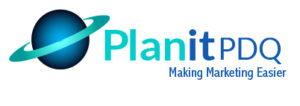It all started when I had an idea.
I’ve been a consultant for almost 20 years helping businesses market their products and services, and while I’ve had thousands of ideas for them, this one was different. This one was mine.
What if I didn’t have to cobble together spreadsheets to plan and track content projects for clients? What if I could build an easy-to-use marketing planner tool that was based on an actual calendar, could be customized to fit any company’s activities, that tracked analytics, and could be shared with a team?
 How hard could it be?
How hard could it be?
Fast forward a lot of hours and a chunk of money, and I am proud to say that PlanITPDQ is a reality. (Seriously! Go ahead and check it out!)
If you are contemplating making the entrepreneurial leap, I am happy to offer the following advice based on some of the things I have learned on this journey.
1. Find smart people and ask them questions.
One of the first people I talked with was Kay Aikin of Introspective Systems. I described what I wanted to build and asked her what kind of programmer I needed. I still remember the look on her face when she said, “Us. We’ll build it for you. I need something just like that.”
You won’t always get that kind of response, but you will be surprised at how many people are eager to hear what you’re doing and happy to offer ideas or help. People have told me how they funded their companies, whether they hired a team or contracted resources, how they onboarded users, what money was well spent when building their company (and what money they wish they hadn’t spent…), and countless other insights.
I have been blown away by how many people have offered advice, introductions, and support. Honestly, this has been probably the best part of this journey, and I am thankful every day. Don’t skip this step.
2. Figure out your money. Early on I asked an exec with a successful exit what I should expect to pay to build the software (see Advice #1). I thought for sure I could get it done for half the price. Guess who was right? Bottom line, you will probably need more cash than you think, so figure out where you can get it before you start. I have been fortunate to receive two grants from MTI (thanks MTI!) and to work in trade with Introspective (thanks, Introspective!), and I have an ongoing consulting business, so I have been able to self-fund. That might not be the right path for you (and it might change for me at some point, too), but you have to figure out.
3. Embrace your inadequacy. I know how to help clients market their products and services. I may use different methods, tools, and approaches and am constantly learning new things, but in general, I feel like I know what I’m doing. But building software is very different. If you are planning to do something outside of your main body of knowledge, be prepared to wake up each morning feeling like a novice. Find a way to be ok with learning as you go.
4. Deciding what NOT to do is just as important as deciding what TO do. There are so many decisions in this process: self-fund or look for VC? Is your beta good enough to go live? Is it good enough to start charging? Who should you hire?
The mental log of “things you need to figure out” is endless, and it’s tempting to tackle some of the smaller questions simply to check stuff off of the list. But earlier this year I had a breakthrough in my thinking – by tackling some of the big questions (funding, hiring) I have been able to slash dozens of smaller decisions off of my list. For example, deciding NOT to pursue external investment right now has enabled me to focus on things other than learning how to navigate that system.
5. Try to enjoy the rollercoaster. This process is interesting, challenging, and exciting. It also can be expensive and demoralizing. It’s easy to look at everyone who is successful and think they sailed through while you can’t seem to get out of your own way. But ask any person who has done this (see advice #1) and they’ll tell you they felt lost, made bad decisions, and stumbled along the way.
Enjoy the highs and don’t let the lows get you down too much. The day that Facebook threw a wrench in our analytics integration by changing its API policy was a bad day. The day when a user said, “This is exactly what I want!” was a good day. And the day I got my trademark approval (which just so happened to be yesterday) was a good day. There will be dozens more in each category as this year goes on. When I am particularly down, I remind myself of all I have done so far rather than focusing on what’s left to do.
6. Pay it forward. I am nowhere near the end of this journey. I have a solid tool with many of the features I want, some users who really love it, and am ready to start commercializing. I have so much yet to learn. But I already know that I want to help others the way that people have helped me. If you don’t have someone to talk to, reach out to me. This is a community and it is awesome. Join us.
Alison Harris is the founder of Harris Marketing Services, where she serves as a virtual CMO for B2B firms, and the founder of PlanITPDQ®, an online tool that helps you manage all of your marketing projects from one simple screen.



